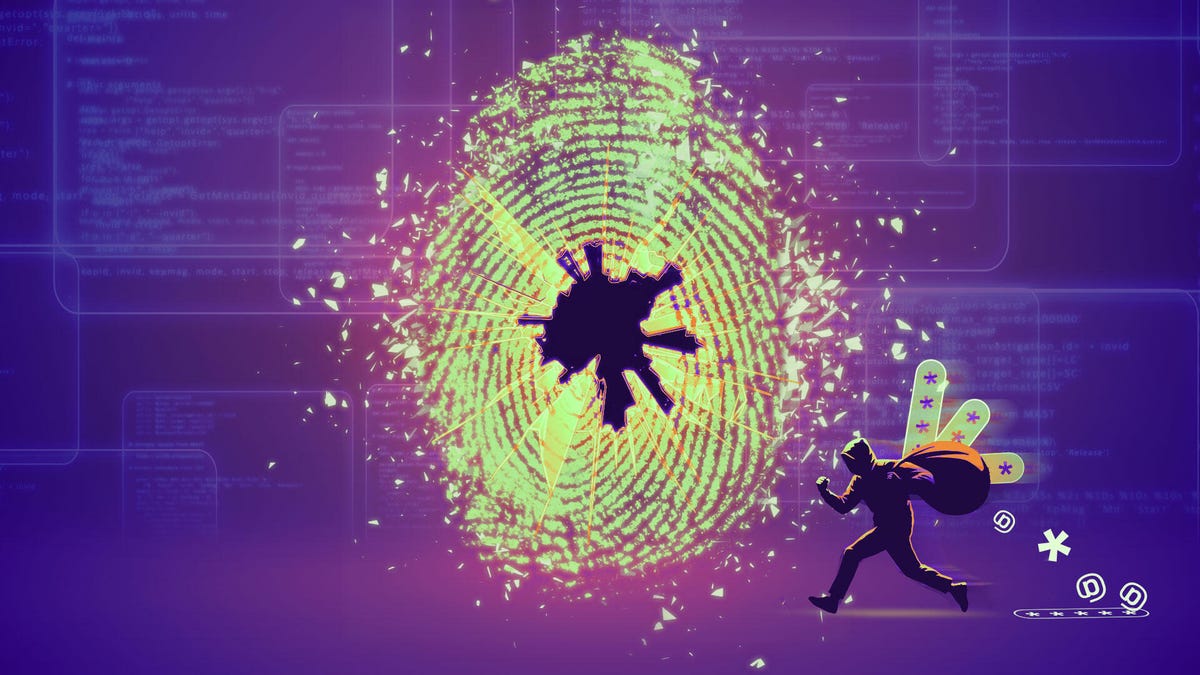CNET study finds 66% of shoppers worry about falling victim to a holiday scam this season

In case you’re like me, then your delicate knowledge has been compromised in a knowledge breach greater than as soon as.
A brand new CNET survey discovered that 47% of US adults know their private knowledge was uncovered in a cyberattack, with Gen X and Child Boomers reporting larger ranges of their delicate knowledge being uncovered. movement. About half of millennials surveyed mentioned they too have been affected by a knowledge breach, whereas one in 4 Gen Z respondents say their knowledge was leaked.
Knowledge breaches happen virtually each day for quite a lot of causes, together with phishing assaults by malicious actors, human error, and even workers looking for to make the most of firm knowledge.
The excellent news is that knowledge breaches don’t immediately lead to identification theft or fraud. Nonetheless, it’ll put you at better danger of phishing makes an attempt in your private gadgets. So it is as much as us to maintain our knowledge and identification secure. This begins with growing wholesome on-line habits.
We discovered that 71% of American adults made dangerous on-line safety strikes prior to now yr that would additional compromise their private knowledge and identification if focused by a cybercriminal.
Notable Web Safety Errors Made This Yr:
- Utilizing the identical password on a number of accounts.
- Saving a password on their telephone or laptop (not via a password supervisor or inside a cell browser).
- Opting out of two-factor authentication for some or all on-line accounts.
CNET’s cybersecurity survey additionally revealed developments in how folks reacted after studying about their involvement in a knowledge breach, what scams fear them essentially the most, and the way they’re defending their on-line identities, particularly through the busy vacation buying season. .
Key relationships
- 84% of respondents are utilizing some sort of technique to guard their private knowledge this vacation season.
- Nonetheless, 71% of US adults have already taken actions thought-about dangerous by safety consultants in defending their private knowledge prior to now yr.
- CNET discovered that 41% of US adults surveyed have used the identical password on a number of accounts prior to now 12 months. Maybe extra worryingly, one in 5 adults have additionally opted out of two-factor authentication prior to now yr.
- One in 5 American adults are not sure if their knowledge has been compromised in a cyberattack.
Most individuals change their passwords after a knowledge breach
The primary steps you are taking after studying you have been affected by a knowledge breach are essential. Most adults, 68% to be actual, have modified their password after studying of a cyberattack, whereas one other 41% signed as much as two-factor authentication on a number of on-line accounts.
Different standard responses to exposing your info in a knowledge breach embody putting a fraud alert on credit score experiences (35%) and signing up for identification theft safety (33%).
When an organization suffers a knowledge breach, they usually ship notices by mail to probably affected clients that embody free activation codes for identification theft safety. Protection sometimes spans one or two years—relying on the severity of the breach and what private info was compromised. However you’ll be able to join identification theft safety your self after the supply expires.
Defend your private knowledge and get peace of thoughts with CNET’s high decide for identification theft software program.
Probably the greatest methods to guard your self after a knowledge breach was not a step most respondents took. Solely 27% of American adults mentioned they freeze their credit score after a breach. Credit score freezes are free to the general public and are a good way to discourage identification fraud, consultants say. I froze my credit score in April and located it to be a easy course of.
“By no means wait to be notified of a knowledge breach to freeze your credit score,” mentioned Adam Levin, creator and co-host of the What the Hack with Adam Levin podcast. “In case your credit score is frozen, nobody can entry your credit score information. Which means it’s not possible for anybody – together with you – to open a brand new credit score account till your file is frozen.”
Notably, 20% of adults stopped utilizing an organization’s providers solely after being affected by a knowledge breach.
Most People have dangerous password habits
Whereas knowledge breaches are out of the client’s management, the way you defend your knowledge on-line is one thing you’ll be able to handle. All of it begins with sturdy password hygiene.
CNET discovered that 41% of US adults surveyed have used the identical password on a number of accounts prior to now yr. It is a follow that makes you inclined to credential stuffing by cybercriminals — the place they achieve entry to at least one account and take a look at the identical credentials elsewhere.
Consultants, because of this, advocate utilizing a novel password for every of your on-line accounts. If this sounds too troublesome, a password supervisor may help.
“With a password supervisor, you need not keep in mind any of your passwords as a result of the software program shops all of them for you in a safe vault and might autofill them if you log into your accounts,” mentioned Attila Tomaschek, author of the CNET workers and digital privateness knowledgeable.
A password supervisor can monitor the darkish internet for compromised credentials and notify you of information breaches, so you’ll be able to replace your passwords in the event that they’re uncovered, he added.
Maybe extra worryingly, one in 5 adults have additionally opted out of two-factor authentication prior to now yr. Many monetary establishments and retailers will periodically ship push notifications or textual content codes to your telephone to confirm your identification or whether or not you have accessed your account from a brand new machine. This further layer of safety may help hold cybercriminals at bay and warn you if somebody is attempting to entry your account.
“This will appear slightly inconvenient and add a couple of further seconds to the login course of, but it surely’s price it,” mentioned Neal O’Farrell, a cybersecurity knowledgeable and CNET knowledgeable board member.
Cybersecurity is high of thoughts for buyers this vacation season
The vacations deliver a variety of pleasure, but in addition an elevated danger of falling right into a rip-off that may spoil your nice temper.
General, 84% of individuals surveyed mentioned they’re taking some type of further safety this yr when shopping for items. Whereas some buyers will solely store in particular person, practically half of adults (48%) mentioned they may solely store on respected web sites. Many (43%) are additionally selecting to purchase immediately from cell apps like Amazon, Walmart, Goal and Etsy to keep away from being lured to faux web sites.
Thirty-seven p.c of vacation buyers can even strengthen password hygiene by taking steps equivalent to enabling two-factor authentication on new accounts or utilizing distinctive passwords, a password supervisor or a password lock.
Fewer mentioned they’d verify whether or not an internet site has “https” encryption (31%) or use a digital pockets equivalent to Apple Pay or Google Pockets and Samsung Pockets (24%). Digital wallets use tokenization, which in easy phrases prevents a retailer from viewing or storing your precise card info. If that retailer is attacked sooner or later, your card info will stay secure.
Non-delivery scams hassle patrons essentially the most
With fraud on the rise, 66% of People are involved about falling sufferer to a rip-off this vacation season and past.
A few quarter of respondents are most afraid of undeliverable bundle scams. These fraudulent schemes contain scammers sending an e-mail or textual content that appears prefer it’s from UPS or FedEx that features a faux buy notification or claims there’s an issue with a cargo. The objective is just to steal your private or monetary info after you click on the hyperlink offered.
“The perfect factor to recollect is to simply skip the hyperlinks, and undoubtedly any attachments, in these messages,” mentioned Bree Fowler, senior cybersecurity and digital privateness author at CNET. “As a substitute, go on to the shipper’s web site (UPS, USPS, FedEx.) and enter your monitoring info. If the message seems to be from a retailer you do enterprise with, go on to the app or web site of of the Web.”
Bundle scams are all the time massive this time of yr, with extra folks buying on-line for the vacations. Customers spent a complete of $13.3 billion on Cyber Monday alone this yr, up 7.3% yr over yr, in keeping with Adobe.
One in 5 People additionally worry being scammed by buyer assist scams, the place a fraudster pretends to work for a legit establishment and convinces you to share your account info. Different frequent scams that persons are afraid of falling for embody charity scams, reward card drain scams, and romance scams.
Moreover, with tax season proper across the nook, you must also file your taxes early to keep away from tax return fraud and watch out for being scammed by a rip-off artist claiming you owe the IRS cash.
In case you ever obtain an unsolicited name or textual content, dangle up and name the corporate or federal company immediately utilizing the quantity on its official web site to verify the validity of the communication.
“By no means establish your self with anybody who contacts you, even in case you imagine they’re somebody in authority at a authorities company or a corporation with which you might have a relationship,” Levin mentioned.
Scammers usually prey on you by injecting a false sense of urgency into their requests. Do not fall for this. As a substitute, take time to consider what is going on on so you do not by chance make it straightforward for a fraudster to get their fingers in your delicate knowledge or cash.
“Crime is like every enterprise, and criminals solely have a lot time they’ll commit to a specific goal earlier than they deem it ineffective,” O’Farrell instructed CNET. “The tougher you make it for them and the extra you frustrate their efforts, the quicker they will transfer on.”
METHODOLOGY
CNET commissioned YouGov Plc to conduct the survey. All figures, except in any other case acknowledged, are from YouGov Plc. The full pattern dimension was 2,518 adults. Fieldwork was undertaken between 4-7 November 2024. The survey was performed on-line. Figures are weighted and consultant of all US adults (age 18 and older).




